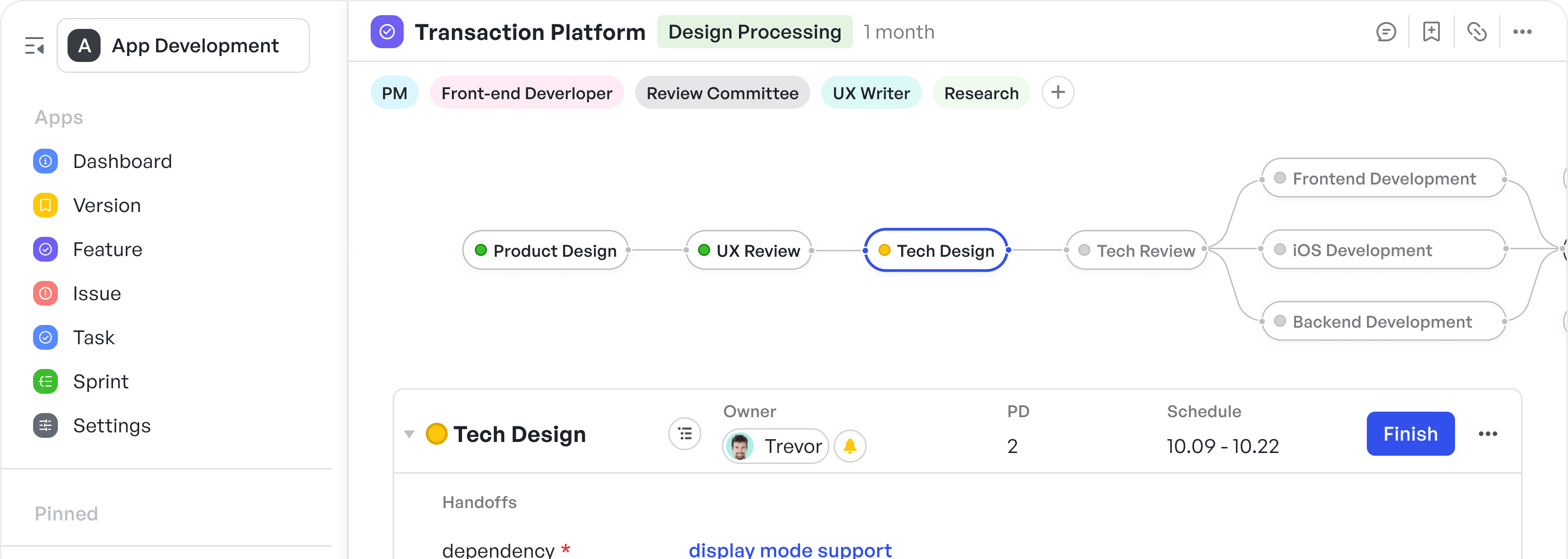Top Project Management Skills: A Beginner’s Guide

“This could’ve been caught earlier.”
“We’re behind again — why wasn’t this flagged?”
“Can someone actually own this?”
You’ve probably heard one of these during a project gone sideways. These aren’t signs of laziness or apathy. They’re symptoms of a bigger issue—no one ever taught the team how to manage projects properly.
Project management isn’t just for people with certifications or fancy job titles. It’s a learnable skill set that combines clear planning, active communication, smart decision-making, and confident leadership. When you learn how to apply these skills in real work, projects stop falling apart and start moving forward.
According to the Project Management Institute's (PMI) Talent Gap report, 2.3 million people will be needed each year for project management roles through 2030. Companies are prioritizing problem solvers and relationship builders who can lead teams and deliver strategic value.
In a thread on Reddit, user More_Law6245 asked, "As a project manager, what is the most important skill you should bring to the table? Is it technical knowledge, people soft skills, or policy, process, and procedures?"
To which BeebsGaming responded,
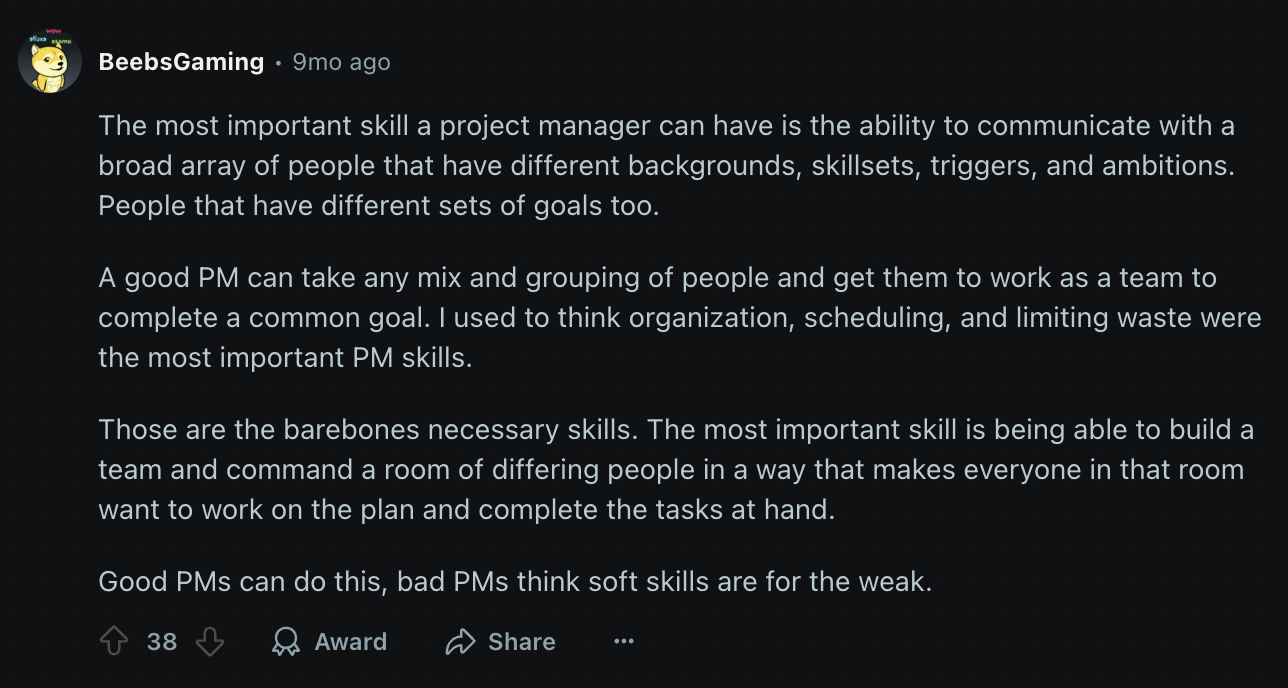
As we can see above, communication skills now rank at the top, with 68% of project management professionals naming it their top priority, followed by problem-solving (65%), collaborative leadership (62%), and strategic thinking (58%). If you can master these skills, you’ll stay ahead in any role that demands real execution.
In this guide, you’ll learn what are the project management skills you need to take control and make progress. You’ll also see how tools like Meegle support your work from day one—even if you’ve never led a project before.
What are project management skills?
Project management skills are the core abilities, techniques, and qualities that help an individual effectively plan, execute, and complete a project within scope, time, and budget constraints. These skills enable project managers to lead teams, manage resources, and meet stakeholder expectations.
The importance of learning project management skills
The responsibility of managing a project no longer sits with full-time PMs or product owners. Ownership now shifts across roles, teams, and timelines. Everyone owns something, such as a project, a feature, or a key deliverable, and success depends on their ability to lead it forward with confidence.
You don’t need formal titles to step up. With the right tools and skills, anyone can drive a project from start to finish. Learning key project management skills helps you take initiative and lead with clarity.
Who is a Project Manager?
A project manager helps a team meet its goals within time, scope, and budget. Their roles and responsibilities typically include:
- Break down goals into actionable tasks
- Assign responsibilities and align stakeholders
- Track timelines, risks, and progress
- Maintain clear communication across the team
Here’s why learning project manager skills benefits you:
- Turns strategic goals into actionable plans
- Builds leadership and decision-making ability
- Prepares you to handle real-world challenges
- Earns trust and credibility with teams and stakeholders
- Makes you job-ready and competitive in the market
- Lays the foundation for long-term career growth
- Enhances your ability to manage time, scope, and budget
- Equips you to lead cross-functional teams
- Helps you communicate clearly and manage expectations
- Enables continuous improvement through reflection and feedback
How to apply project management skills effectively?
Applying project management skills is about using the right tools to turn those skills into action. Whether you're managing deadlines, assigning tasks, or keeping stakeholders informed, the key is execution.
Meegle helps you put your project management skills to work by giving you a clear, clutter-free space to manage progress, assign ownership, and keep your team aligned. You don’t need to master complicated systems. Meegle makes it easy to:
- Create and follow structured workflows using built-in templates
- Get real-time visibility into project updates, priorities, and blockers
- Assign tasks quickly with clear ownership and timelines
- Spot delays early and adjust the course before things go off track
- Share progress with stakeholders without constant status meetings
You might already be using some of these skills. Others will grow with you. The more intentionally you apply what you know, supported by a tool like Meegle, the more confidently you can lead.
Suggested Read:👉Project Management Methodologies: 12 Popular Frameworks
Top 15 project management skills in 2025
To succeed as a project manager in 2025, you’ll need a mix of technical expertise and soft skills. We've divided the list below to help you focus on both, the tools you use and the way you lead.
Technical Project Management Skills
These essential project management skills help you plan, execute, and monitor projects effectively:
- Project planning & scheduling: Breaking down the project into phases, tasks, and milestones with clear deadlines, owners, and dependencies.
- Budgeting & cost management: Estimating, allocating, and tracking budgets to ensure the project remains financially viable and within scope.
- Risk management: Identifying, analyzing, and mitigating risks that could derail project timelines, deliverables, or budgets.
- Quality management: Defining quality benchmarks and monitoring deliverables to ensure standards are met throughout the project lifecycle.
- Technical tool proficiency: Using project management software like Gantt Charts, Kanban boards, CRMs, or dashboards for visibility and control.
- Agile & methodology expertise: Applying frameworks like Agile, Scrum, or Waterfall based on the project's size, complexity, and pace.
Soft Project Management Skills
These people-centered skills help you lead teams and manage stakeholders with confidence:
- Communication: Sharing updates, managing expectations, and facilitating cross-functional collaboration with clarity and transparency.
- Leadership Setting direction, motivating team members, resolving conflicts, and creating accountability within the team.
- Problem-solving: Quickly identifying roadblocks and applying logic, creativity, or escalation to resolve them effectively.
- Negotiation: Managing competing priorities or expectations among clients, vendors, and stakeholders to reach optimal outcomes.
- Time management: Prioritizing high-impact tasks, reducing wasted effort, and ensuring deadlines are consistently met.
- Adaptability: Adjusting plans and tactics when scope, resources, or timelines shift without compromising final outcomes.
- Stakeholder management: Engaging sponsors, clients, or external partners through regular reporting, feedback loops, and visibility into progress.
- Decisiveness: Making informed choices quickly, especially when project momentum or outcomes are at stake.
- Accountability: Taking ownership of the project’s results, ensuring that commitments are met, and lessons are learned from setbacks.
Top technical skills for project managers
1, Project planning and scheduling
The ability to plan and schedule effectively is what separates strategic intent from operational chaos. It’s requires constructing a coherent framework that aligns resources, sets clear expectations, and anticipates dependencies and constraints. Exceptional project planning transforms abstract objectives into structured initiatives, fostering clarity, ownership, and sustained progress.
Without this skill, even the most promising projects risk stalling in ambiguity or collapsing under misaligned efforts.
Key components of this skill - and how Meegle supports it:
- Defining objectives and deliverables: PMs clarify what success looks like. You can structure this using goal nodes and custom objective forms that connect directly to execution plans.
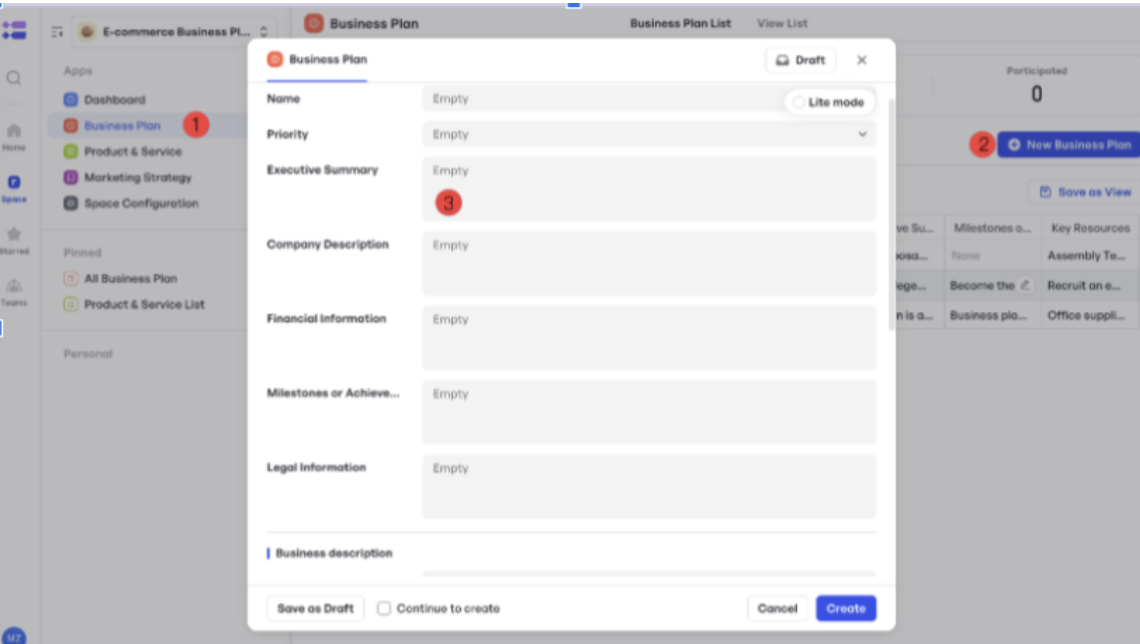 Add your project’s goals, phases, and milestones to get started
Add your project’s goals, phases, and milestones to get started- Breaking down tasks: Use a Work Breakdown Structure (WBS) to split the project into smaller, manageable chunks. This is enabled through task nodes that can be grouped, sequenced, and visualized.
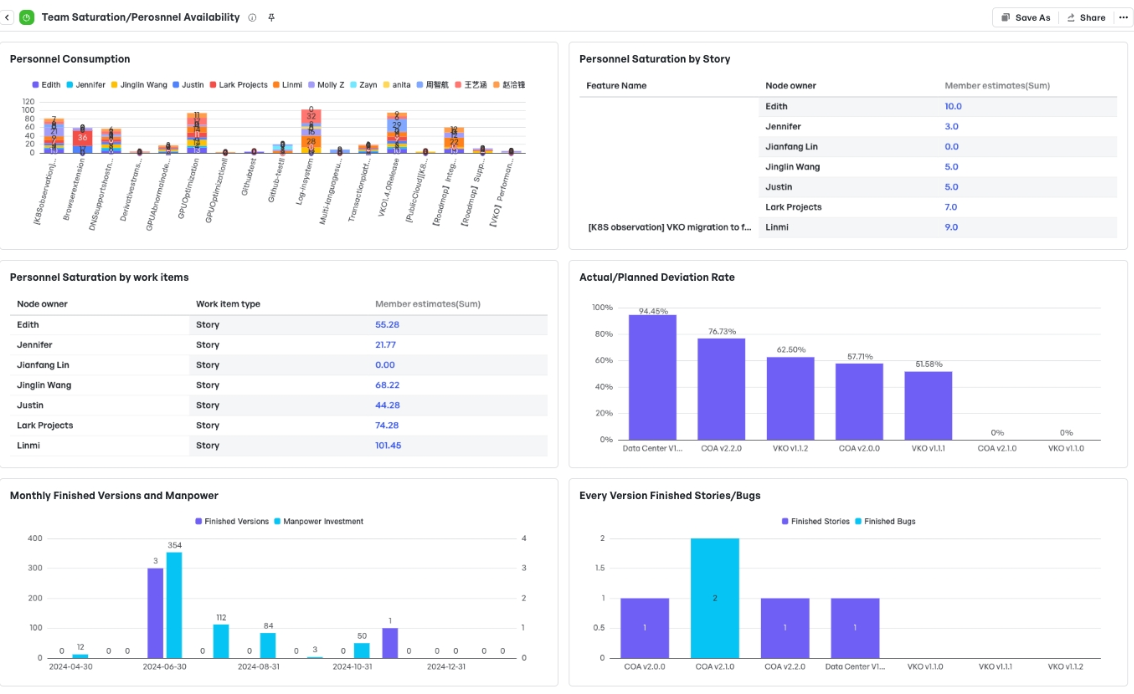 Analyze team saturation with charts
Analyze team saturation with charts- Estimating time and resources: Project managers assess how long tasks will take and who’s available to do them. The workload management feature shows team schedules in person-days to prevent overbooking and support accurate capacity planning.
- Identifying dependencies: Knowing which tasks rely on others prevents delays. Node linking shows task dependencies in real time, with visual alerts for bottlenecks or missed steps.
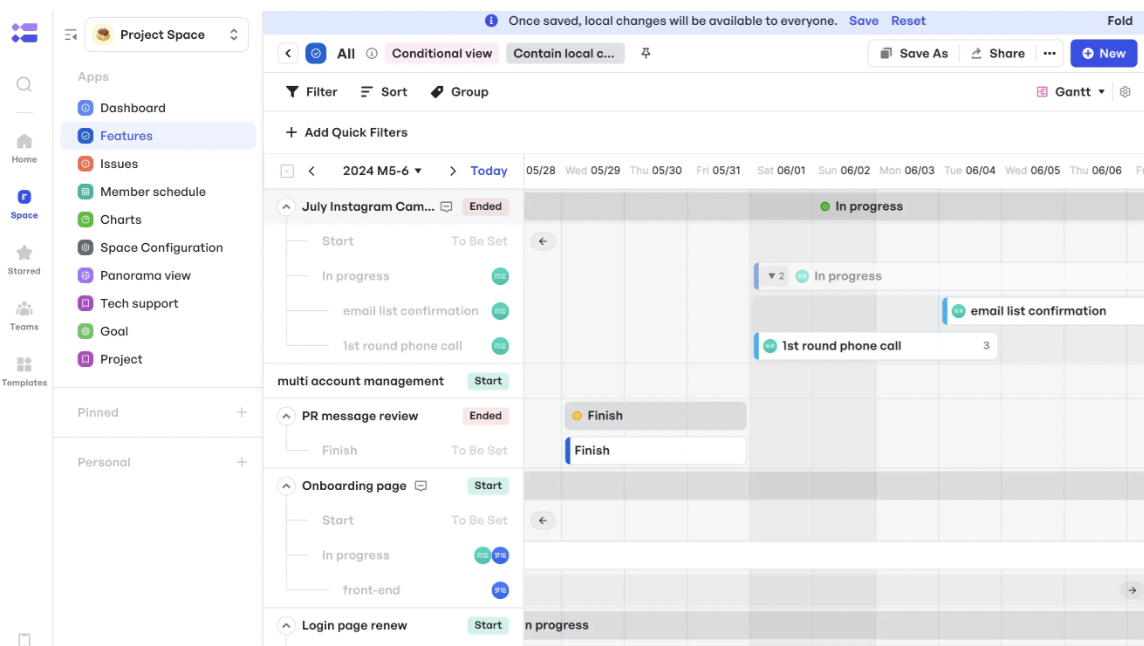 Gantt Chart view in Meegle
Gantt Chart view in Meegle- Creating timelines and schedules: Gantt Charts and project calendars bring clarity to execution. Interactive views auto-adjust as changes happen, keeping everyone aligned.
- Allocating resources: Assigning the right people to the right tasks is crucial. You can allocate resources by skill and bandwidth, with full visibility into workload distribution.
- Setting milestones and deadlines: PMs use milestones to track progress and course-correct early. Checkpoints and automated reminders help you hit critical dates without micromanaging.
Tools used:
- Gantt Charts (e.g., in Meegle)
- Calendars and timelines
- Critical Path Method (CPM)
- PERT (Program Evaluation Review Technique)
- Kanban Boards
How it helps:
- Prevents scope creep by clearly defining the work.
- Improves time management with realistic schedules.
- Enhances team coordination by clarifying who does what and when.
- Increases accountability through milestones and deadlines.
- Enables risk forecasting by visualizing dependencies and slack time.
2. Budgeting & cost management
The success of any project depends on both timely execution and financial discipline. This skill involves translating project scope into a detailed budget, allocating funds to the right tasks, and continuously tracking costs to maintain financial alignment.
The best project managers ensure that every dollar supports strategic priorities—allocating resources where they deliver the highest value and adjusting allocations as timelines and needs evolve. Without this skill, teams risk overspending, under-delivering, or running out of funds before critical milestones are reached.
Key components of this skill – and how Meegle supports it:
- Cost estimation and breakdown: PMs break down the project into phases and tasks, then assign estimated costs to each. Cost fields can be embedded directly into task and phase nodes for granular visibility.
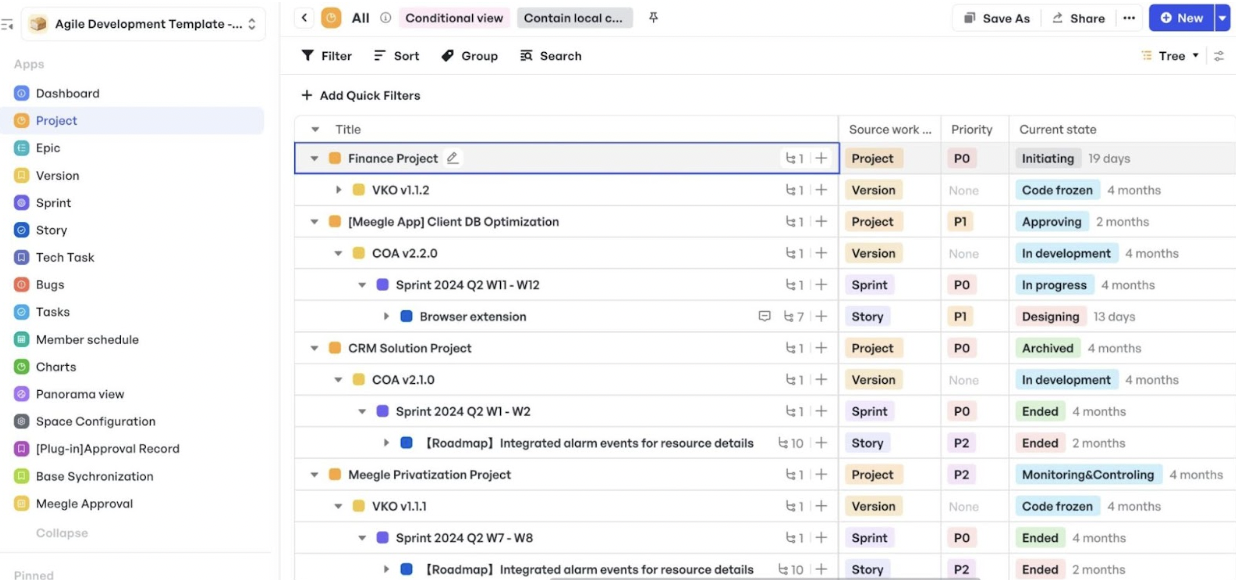 Break down complex projects into manageable components and visualize progress with clarity
Break down complex projects into manageable components and visualize progress with clarity- Defining the cost baseline: Establishing a baseline allows for comparison of planned versus actual spend. Once locked, the baseline becomes a reference point for tracking deviations.
- Expense tracking and reporting: Regular tracking of actual expenses ensures early identification of overspend. Budget trackers show real-time data and flag overruns before they escalate.
- Managing burn rate: Monitoring how quickly the budget is being used relative to project progress helps with pacing and resource planning. Timeline-linked cost views offer insight into whether financial consumption aligns with delivery.
- Forecasting and reallocation: As projects evolve, forecasting future costs and reallocating funds becomes essential. Dynamic cost adjustment and scenario modeling help simulate trade-offs and guide decisions.
- Contingency planning: Setting aside financial buffers protects the project from unexpected risks. Tagged contingency budgets are tracked separately to avoid unplanned disruptions.
Tools used:
- Cost Baseline Sheets
- Financial Dashboards
- Earned Value Management (EVM)
- Budget vs. Actual Reports
- Risk-adjusted Cost Estimators
How it helps:
- Keeps projects financially sustainable by flagging overspend early
- Increases stakeholder confidence with transparent reporting
- Aligns spending with business value and milestones
- Supports data-driven decisions during change
- Ensures audit-readiness with clear cost documentation
3. Risk management
Risk management is the ability to foresee what might go wrong—and prepare for it with structured precision. It’s not guesswork. It’s a disciplined process of identifying uncertainties, evaluating their potential impact, and building proactive measures into the project plan. Skilled project managers treat risk as an input to decision-making, not an afterthought.
This ensures the team moves forward with confidence, clarity, and buffers that protect delivery timelines and budgets.
Key components of this skill – and how Meegle supports it:
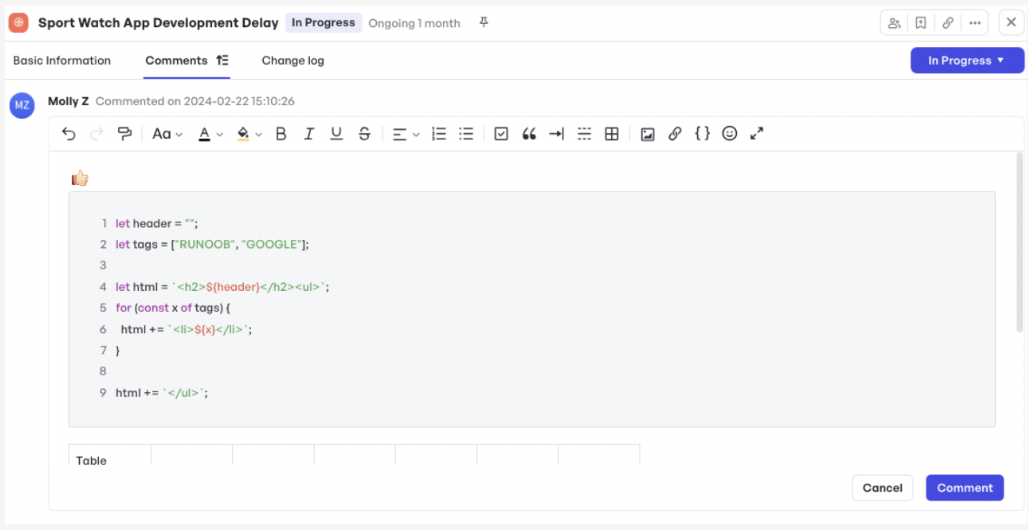 Use comments, @mentions, to-dos, and real-time edits to surface potential issues as a team
Use comments, @mentions, to-dos, and real-time edits to surface potential issues as a team- Risk identification: PMs document internal and external factors that could disrupt progress. Node-level risk fields let teams flag potential threats as part of task creation, creating visibility early.
- Risk categorization and scoring: Risks are assessed based on likelihood and impact, then categorized by type (e.g., technical, resource, external). Custom scoring templates help prioritize which risks require action versus monitoring.
- Response planning: For each high-priority risk, mitigation or contingency plans are developed. These are directly linked to project nodes, enabling owners to view actions and fallback steps in context.
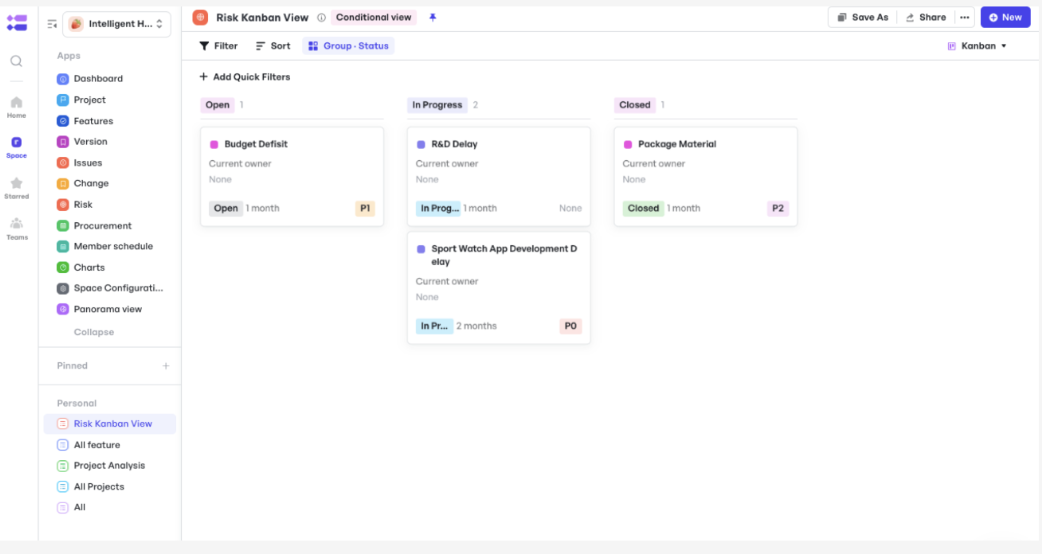 Track risks in real time, stay alerted to changes, and keep your team ready to act
Track risks in real time, stay alerted to changes, and keep your team ready to act- Real-time monitoring: Dashboards track risk status and alert the team when thresholds are crossed. This helps escalate issues quickly and adapt the execution plan as needed.
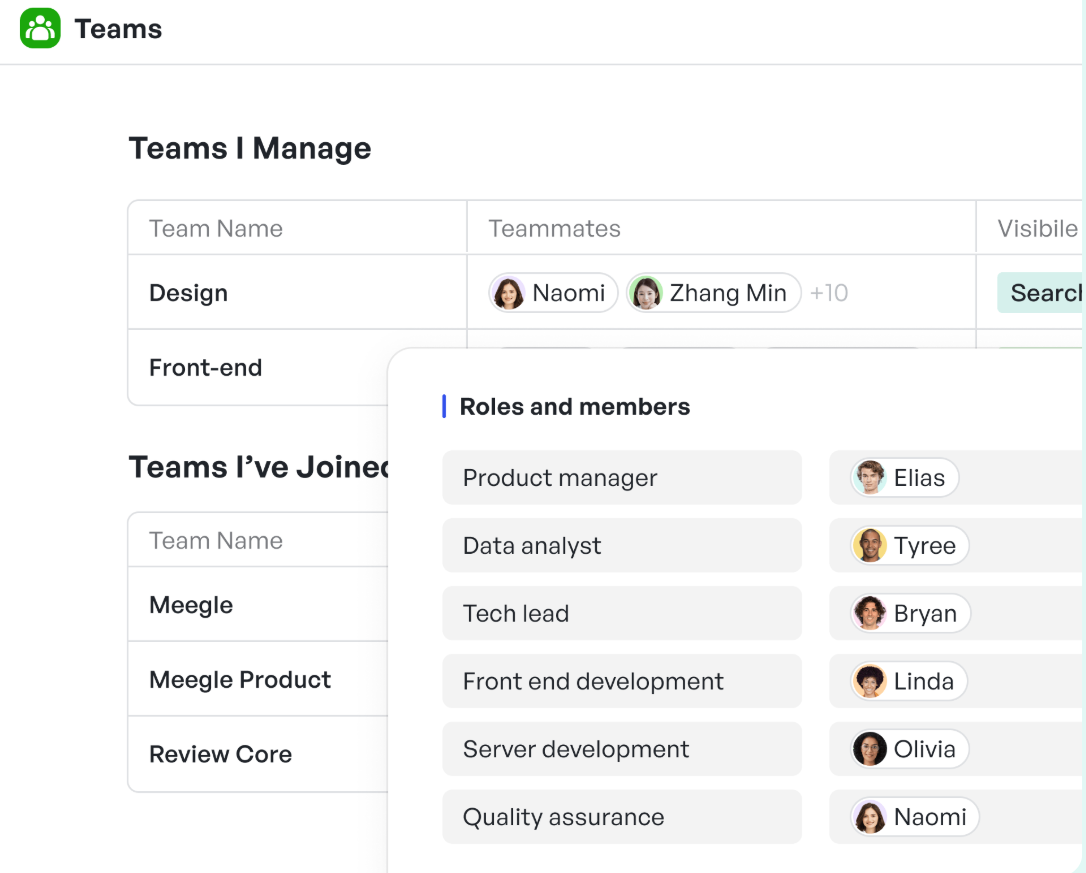 Define specific roles and responsibilities for each team member to maintain clarity and drive consistent project execution
Define specific roles and responsibilities for each team member to maintain clarity and drive consistent project execution- Communication and accountability: Stakeholders are assigned as risk owners with clear responsibilities. @mentions, status updates, and comments make it easy to keep everyone informed and accountable.
Tools used:
- Risk registers
- Risk heat maps
- Probability-Impact Matrix
- RAID logs (Risks, Assumptions, Issues, Dependencies)
- Real-time dashboards
How it helps:
- Promotes early awareness and proactive planning
- Improves decision quality by surfacing potential trade-offs
- Keeps project momentum intact by reducing reaction time
- Builds stakeholder trust through structured transparency
- Enhances agility by embedding resilience into project workflows
Suggested Read:👉Risk Management in Different Methodologies
4. Quality management
Quality management ensures that project outputs meet defined standards and deliver the intended value. It’s not limited to testing at the end—quality is embedded throughout the project lifecycle. Skilled project managers build processes that define what “good” looks like, track it at every stage, and refine it continuously through feedback loops.
This creates consistency in deliverables, reduces rework, and builds customer confidence.
Key components of this skill – and how Meegle supports it:
- Setting quality standards: PMs align stakeholders on what quality means for each deliverable. Standards and acceptance criteria are defined within task and goal forms, setting measurable benchmarks from the start.
- Integrating quality into planning: Quality checks are built into execution plans through dedicated review nodes and approval workflows. This ensures validation happens at the right stages, not just at project close.
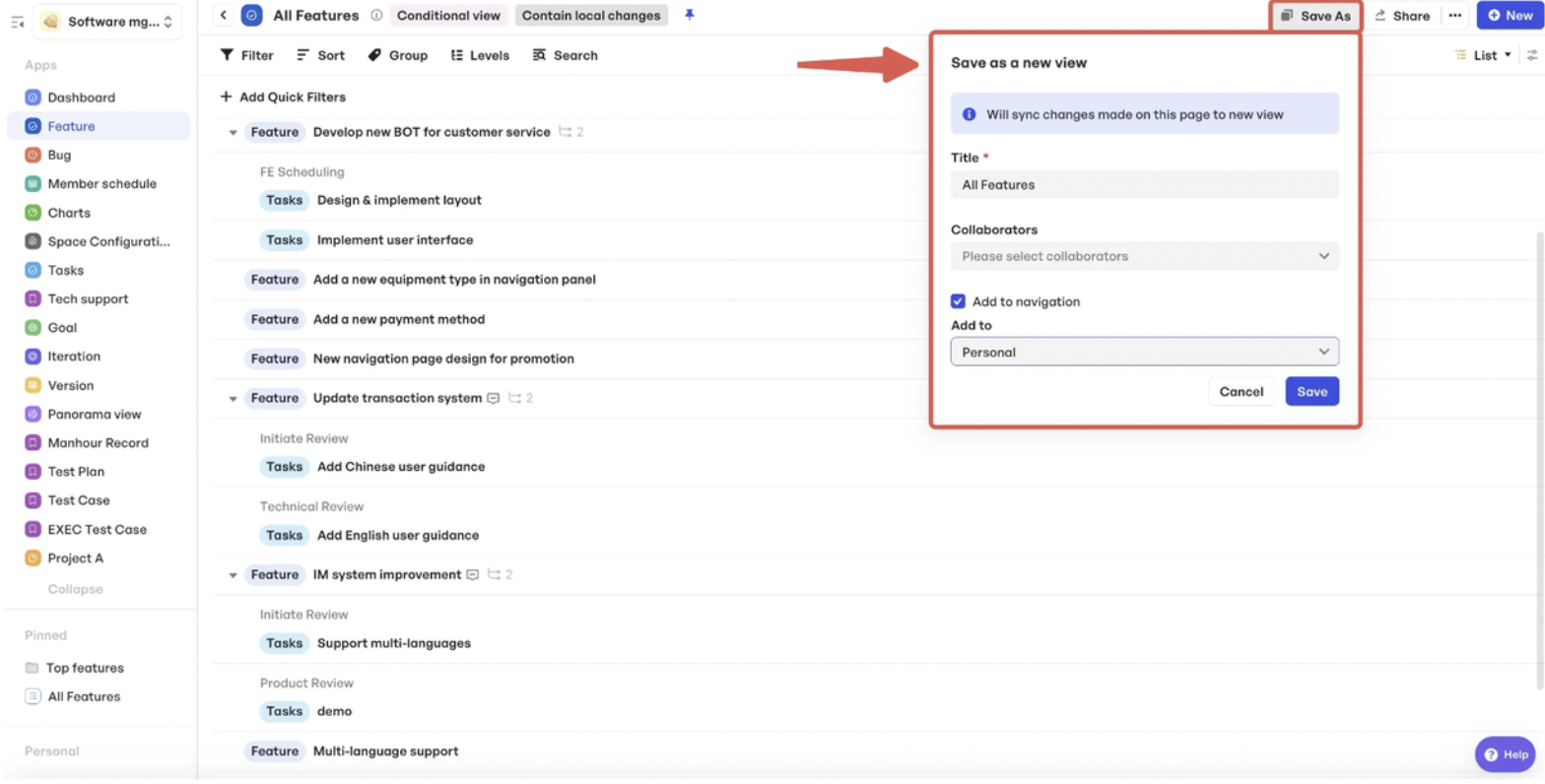 Track overall project progress from a high-level perspective
Track overall project progress from a high-level perspective- Tracking quality metrics: Metrics such as defect rate, rework hours, or stakeholder satisfaction are monitored over time. Dashboards aggregate this data, offering a real-time view of quality performance.
- Facilitating reviews and audits: Structured review cycles and historical version tracking allow teams to audit changes, ensure traceability, and maintain alignment with compliance requirements.
- Driving continuous improvement: Retrospectives, feedback forms, and outcome analysis help identify process gaps. Lessons learned are captured directly in the workflow, so future projects benefit from every iteration.
Tools used:
- Quality checklists
- Acceptance criteria templates
- Root cause analysis tools
- Audit trails and version history
- Feedback loops and retrospective forms
How it helps:
- Maintains consistency across deliverables and phases
- Reduces costly rework by catching issues early
- Supports compliance and audit-readiness with clear documentation
- Builds stakeholder trust through visible quality controls
- Encourages a culture of accountability and improvement
5. Technical tool proficiency
A project manager’s effectiveness often depends on how well they use the tools at their disposal. Technical tool proficiency means more than knowing how to navigate software—it’s the ability to configure, apply, and adapt tools to streamline workflows, enhance visibility, and drive execution at scale.
It’s a core operational skill that transforms planning into action by removing friction across teams and systems.
Key components of this skill – and how Meegle supports it:
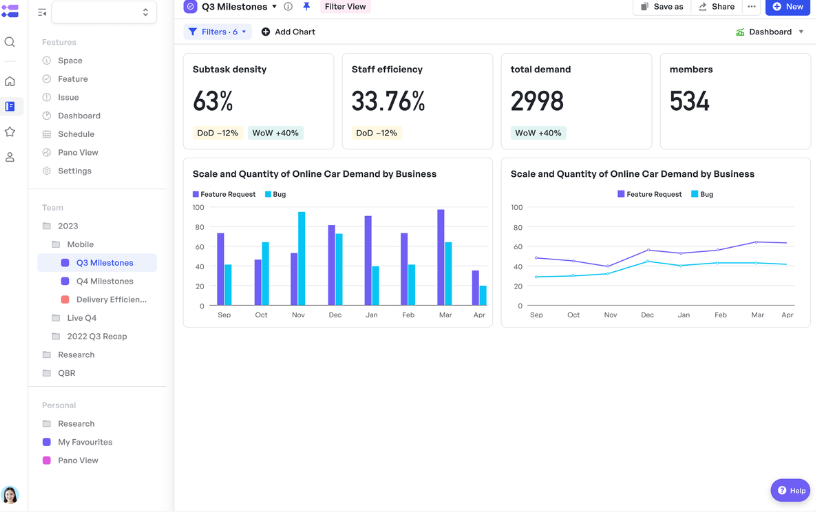 Identify areas for improvement and make informed, strategic decisions
Identify areas for improvement and make informed, strategic decisions- Tool configuration and customization: PMs set up workflows, dashboards, forms, and automations to suit project needs. Custom templates, node types, and field logic ensure tools reflect real processes, not generic setups.
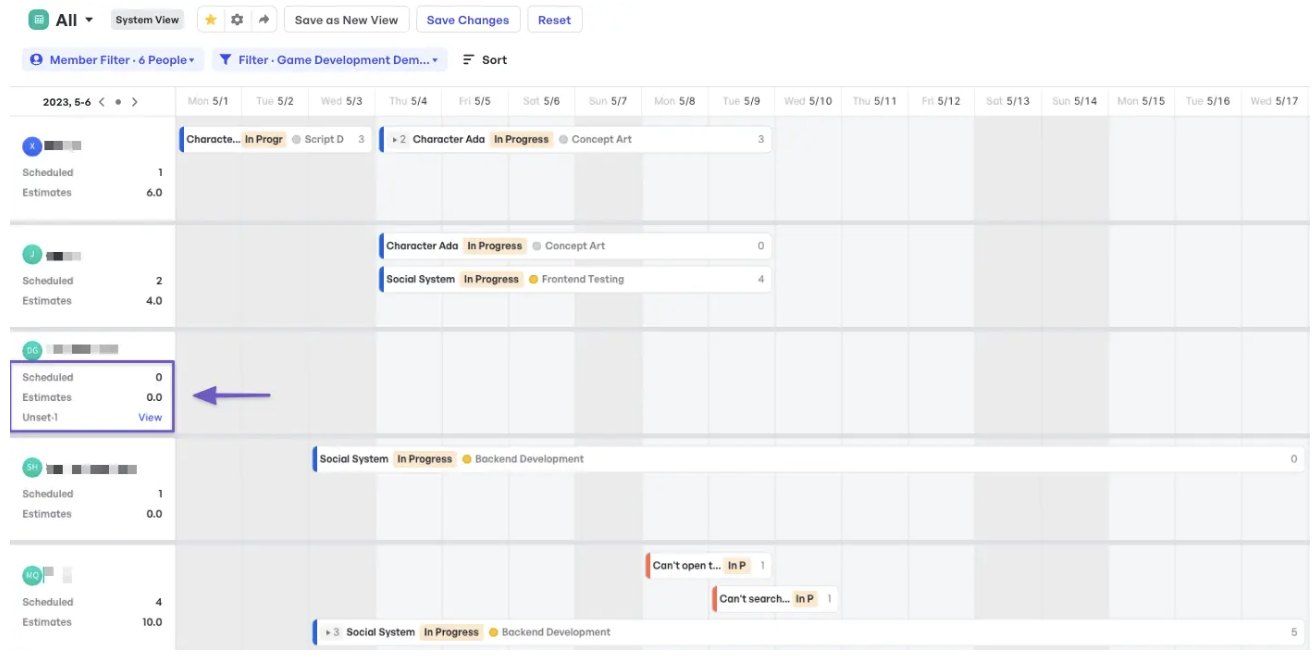 Manage your project calendar in real time
Manage your project calendar in real time- Data integration and sync: Smooth project collaboration depends on a single source of truth. Integration with calendars, file storage, and comms tools consolidates updates, documents, and schedules in one place.
- Real-time tracking and visibility: Interactive views like Gantt, Kanban, and workload charts offer up-to-date progress insights. These reduce dependency on status meetings and support data-driven decision-making.
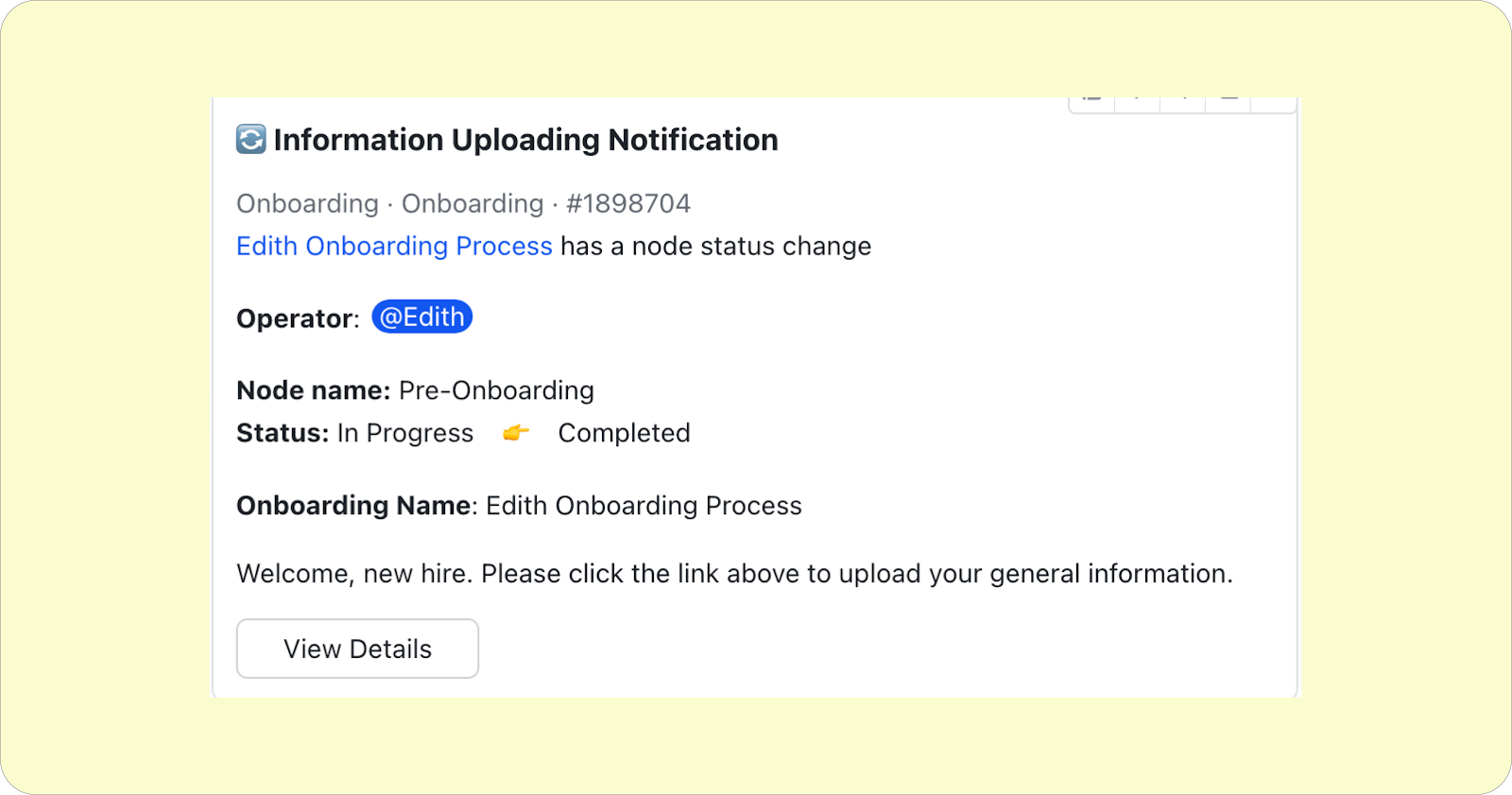 Automate notifications and approvals when tasks are completed
Automate notifications and approvals when tasks are completed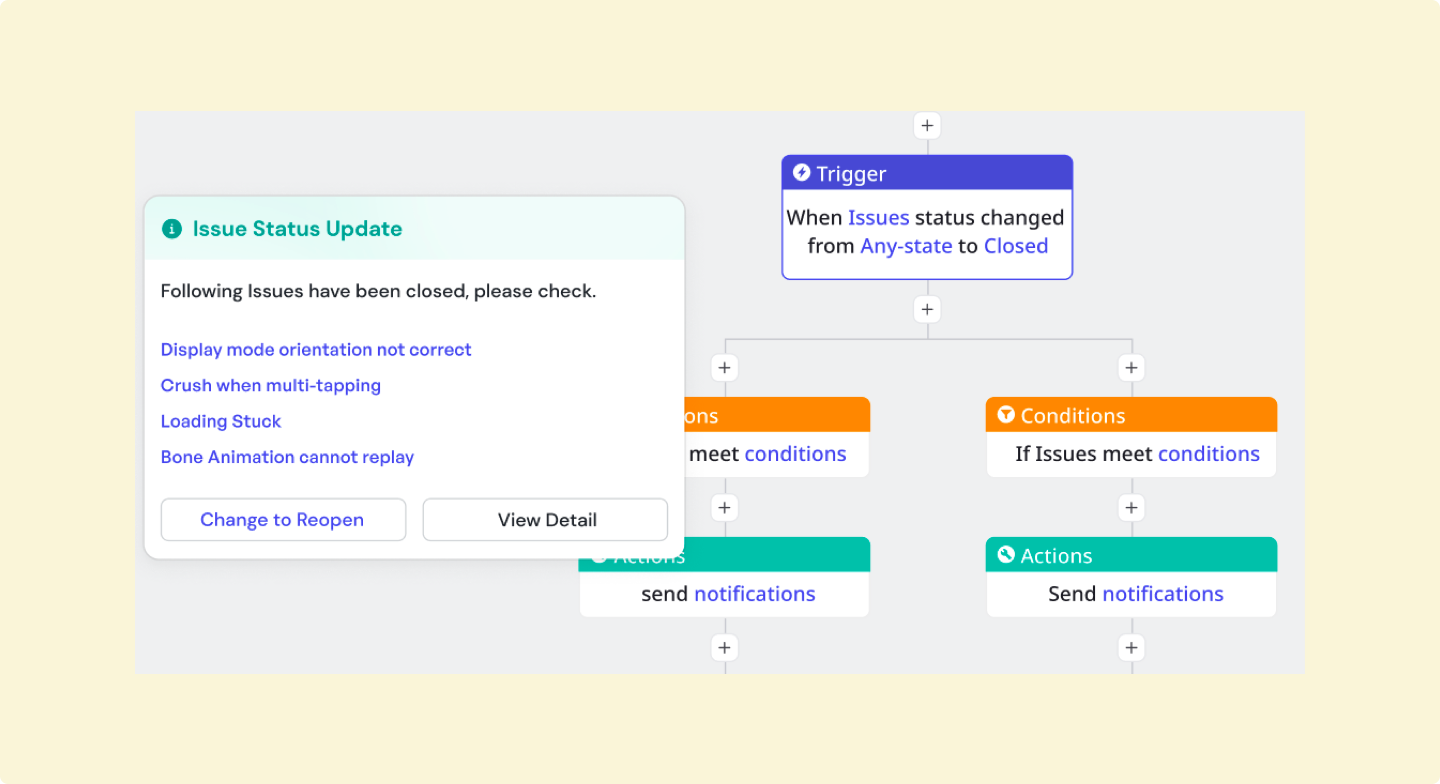 Create automated notifications for custom triggers with Meegle
Create automated notifications for custom triggers with Meegle- Automation and alerts: Automation reduces manual tasks and ensures nothing falls through the cracks. Auto-assignments, due date reminders, and status updates improve consistency and timeliness.
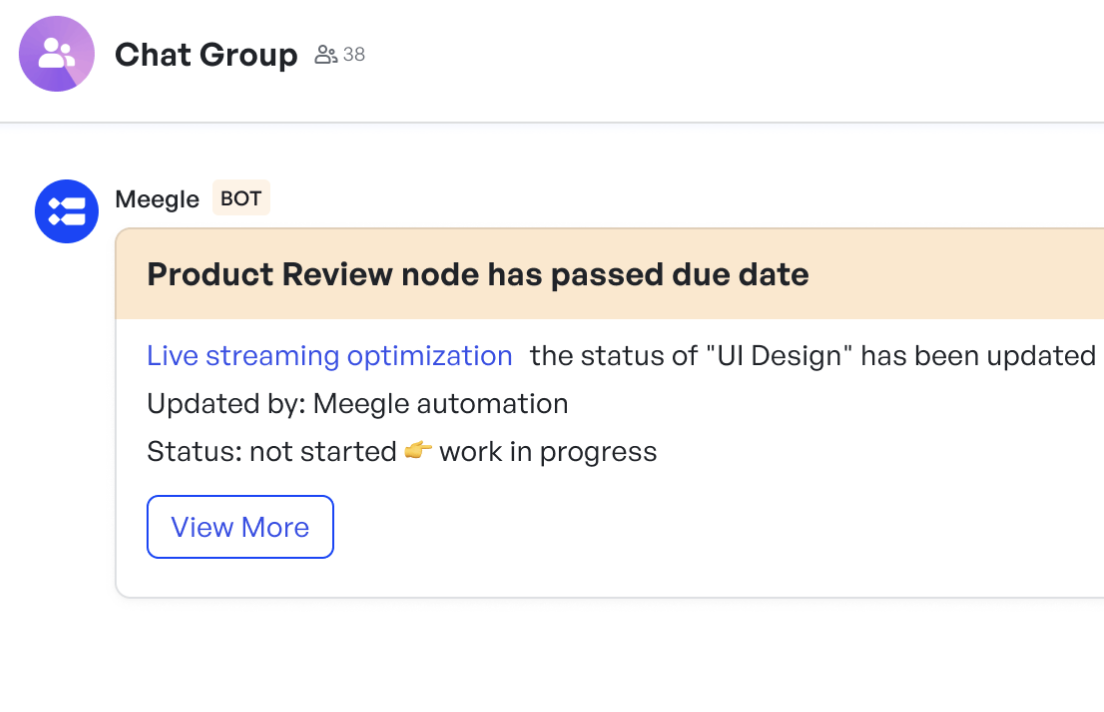 Send a due date reminder to the assigned node owner
Send a due date reminder to the assigned node owner- User management and permissions: PMs manage access based on role, responsibility, and project phase. Permission settings and audit trails ensure accountability while keeping sensitive information protected.
Tools used:
- Gantt Charts
- Kanban Boards
- Workflow automators
- Integration platforms (e.g., Slack, Google Workspace)
- Access and role management systems
How it helps:
- Enhances execution speed through process automation
- Improves visibility and alignment with centralized data
- Reduces administrative overhead for project teams
- Strengthens compliance and control with structured permissions
- Supports scalability by standardizing high-performing workflows
6. Agile & methodology expertise
Project methodology is more than a delivery preference; it shapes how teams think, prioritize, and adapt. Expertise in Agile, Scrum, Kanban, or hybrid models allows project managers to tailor execution styles to project complexity, stakeholder expectations, and team dynamics. This skill involves selecting the right framework and applying it with discipline and flexibility.
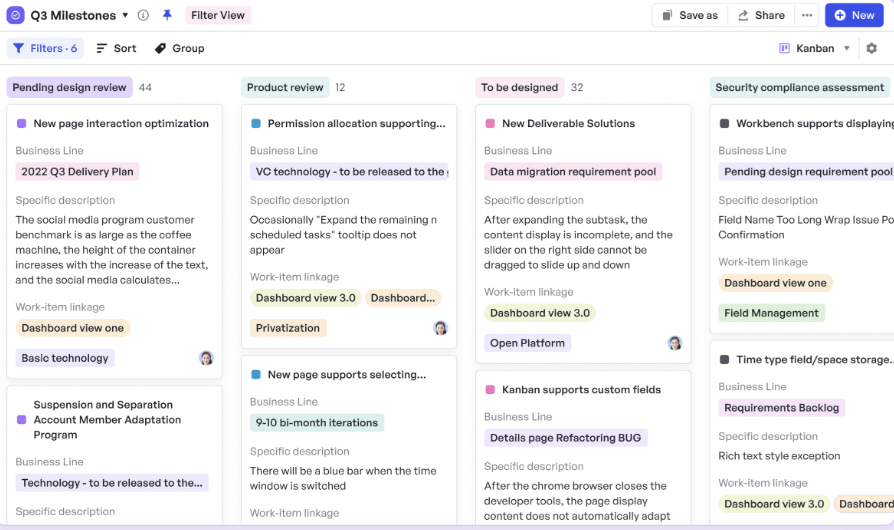 Customize boards, track task progress, and maintain clarity with Kanban View
Customize boards, track task progress, and maintain clarity with Kanban ViewWhen practiced well, it fosters transparency, responsiveness, and continuous value delivery.
Key components of this skill – and how Meegle supports it:
- Choosing the right methodology: PMs assess the nature of the project—fixed-scope, exploratory, or iterative, and align it with the best-suited framework. Whether Agile sprints or waterfall phases, projects are structured accordingly using configurable workflows.
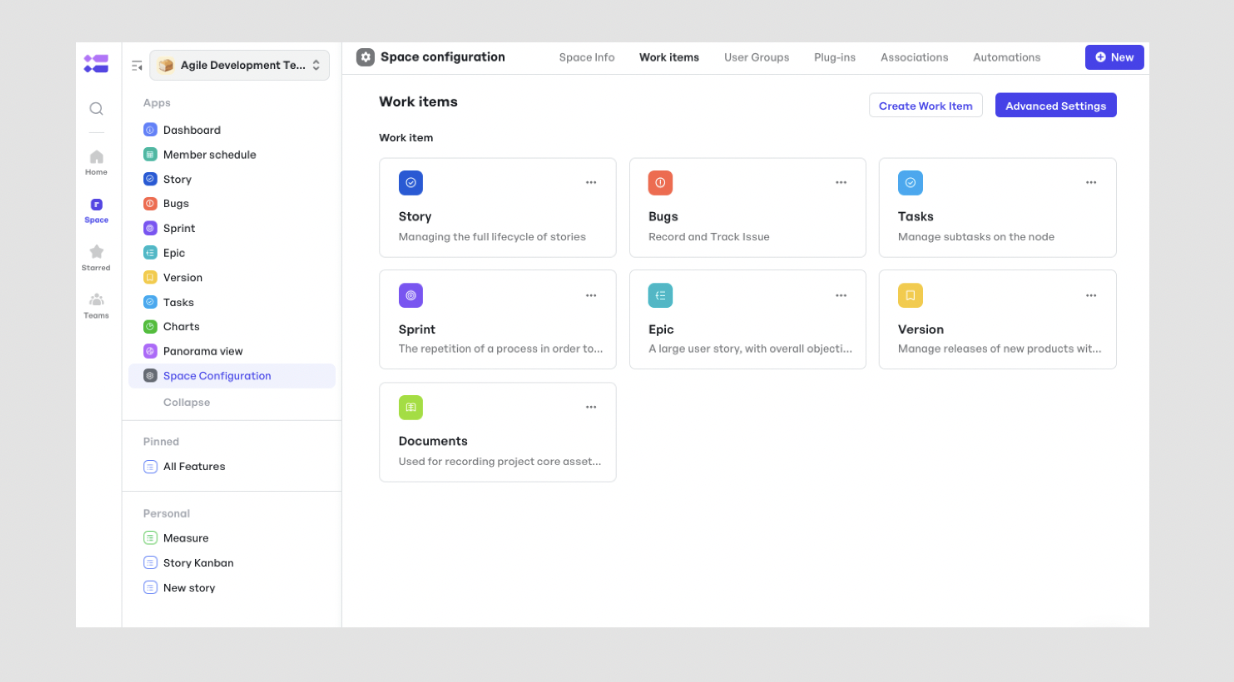 Meegle’s Agile Development Template for efficient project management
Meegle’s Agile Development Template for efficient project management- Implementing sprints and cycles: In Agile projects, sprint planning, backlog grooming, and review ceremonies are managed with sprint boards, customizable task nodes, and calendar sync to maintain rhythm.
- Managing iterative progress: Feedback loops are embedded in every cycle. Tasks can be reviewed, updated, and reprioritized mid-sprint without disrupting the flow, ensuring adaptability without chaos.
- Facilitating team rituals: Daily stand-ups, retrospectives, and demos are tracked through recurring tasks, comment threads, and progress views, supporting collaborative team cadence.
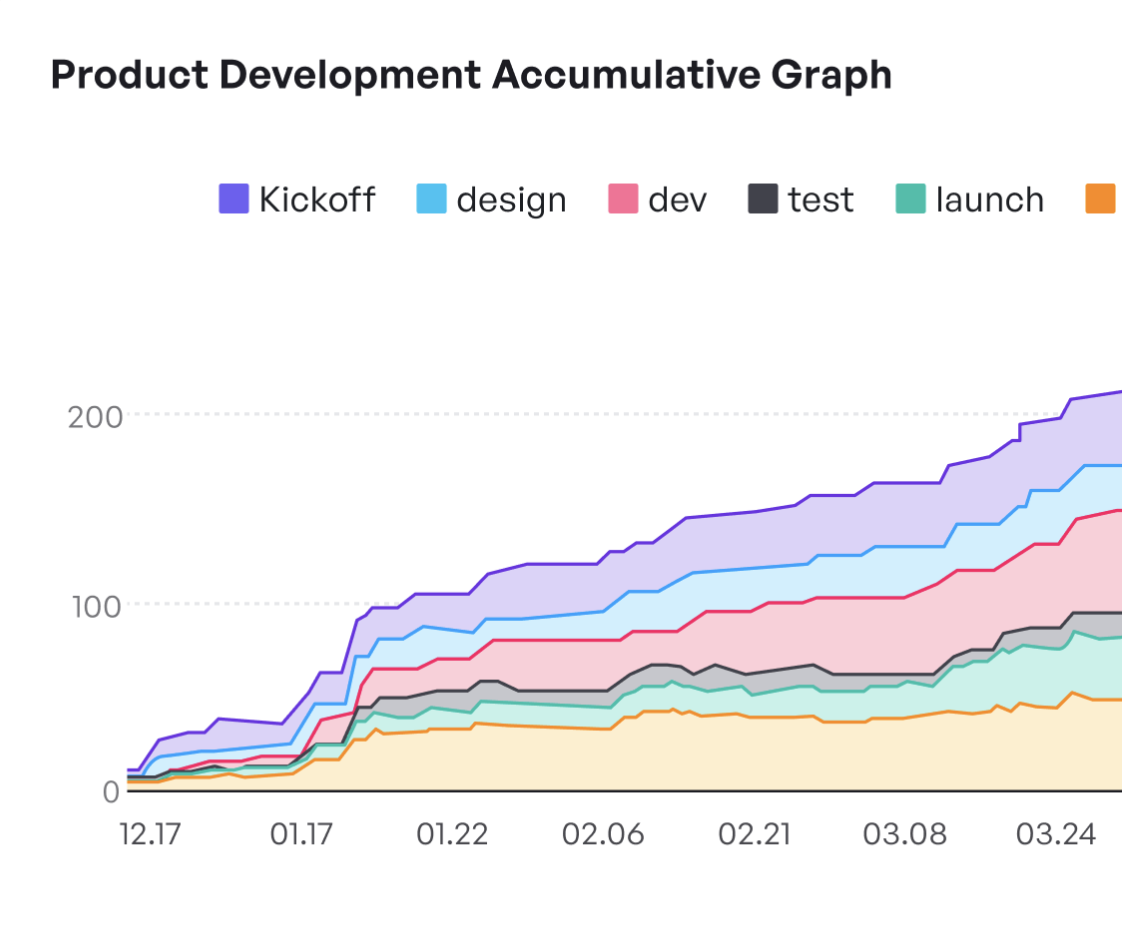 Stay on top of sprint goals with dashboards tracking sprint velocity, burn rates, lead time, and cumulative flow
Stay on top of sprint goals with dashboards tracking sprint velocity, burn rates, lead time, and cumulative flow- Tracking velocity and throughput: Burn-up/down charts, velocity reports, and workflow analytics help assess how much value is being delivered per sprint. This enables teams to forecast better and improve over time.
Tools used:
- Sprint boards and backlogs
- Burn-down/Burn-up Charts
- Workflow analytics
- Retrospective forms
- Methodology templates (Scrum, Kanban, Hybrid)
How it helps:
- Aligns execution with the nature and pace of the project
- Increases responsiveness to change through iterative planning
- Enhances team accountability with structured rituals and roles
- Improves predictability through historical performance data
- Enables continuous delivery and customer-centric development
Top soft skills for project managers
7. Communication
Clear, timely communication keeps projects aligned, accelerates decisions, and builds trust. PMs must adapt messaging for different audiences, ensure continuous feedback, and reduce ambiguity throughout the project lifecycle.
Key components – and how Meegle supports them:
- Stakeholder updates: Custom dashboards tailor insights for execs vs. contributors.
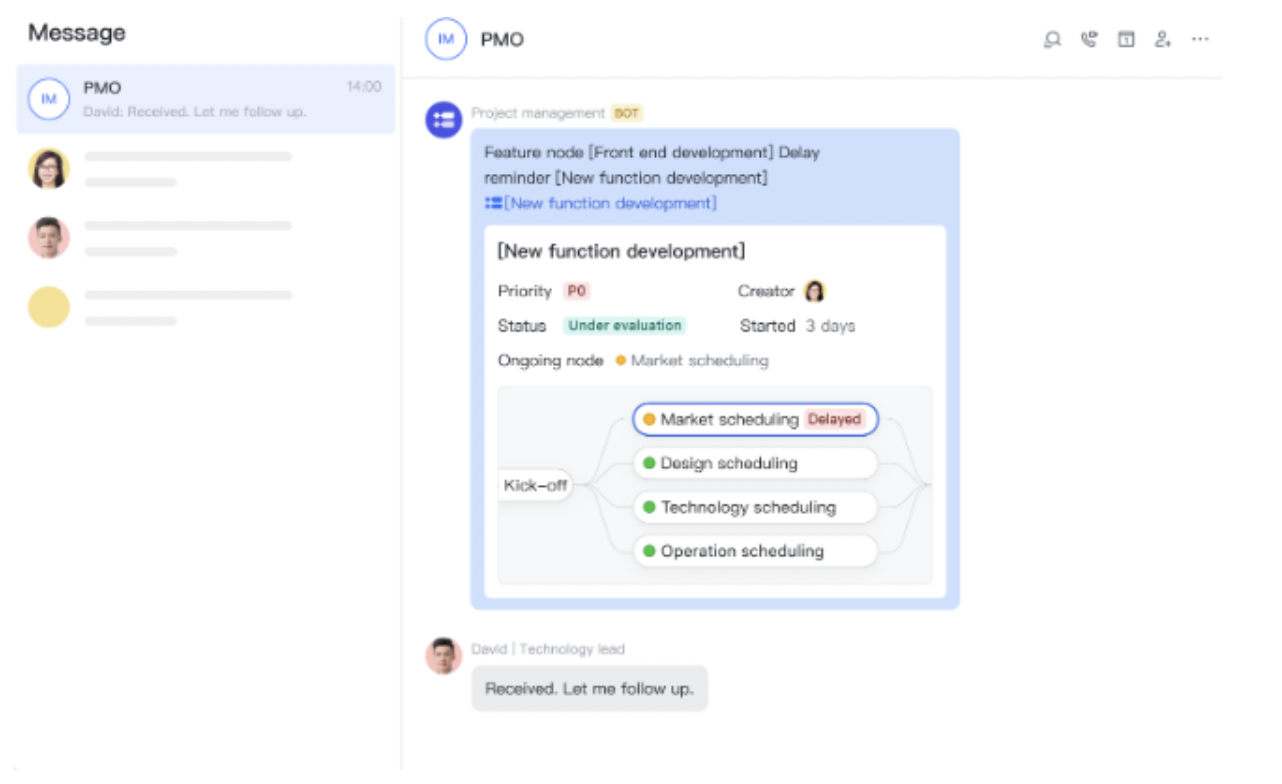 Keep stakeholders updated on project progress and timelines
Keep stakeholders updated on project progress and timelines- Team coordination: Inline comments, @mentions, and attachments keep work conversations contextual.
- Meeting follow-through: Task nodes and note fields turn discussions into actions.
- Status visibility: Auto-updated timelines, milestone indicators, and visual reports highlight progress and blockers.
- Clarity in conflict: Structured workflows surface and resolve issues early through shared documentation.
Tools used:
- Stakeholder dashboards, inline threads, task-linked notes, visual timelines, shared docs.
How it helps:
- Aligns teams and leadership
- Enables faster decisions
- Prevents miscommunication
- Enhances collaboration
- Builds transparency and trust
8. Leadership
Leadership skills in project management are about setting direction, inspiring confidence, and navigating change with clarity. Strong PMs guide with purpose, motivate teams, and stay accountable—especially when priorities shift.
Key components – and how Meegle supports them:
- Vision setting: Project briefs and visual roadmaps define purpose and outcomes.
- Decision-making: Context-rich threads and decision logs clarify trade-offs and prevent rework.
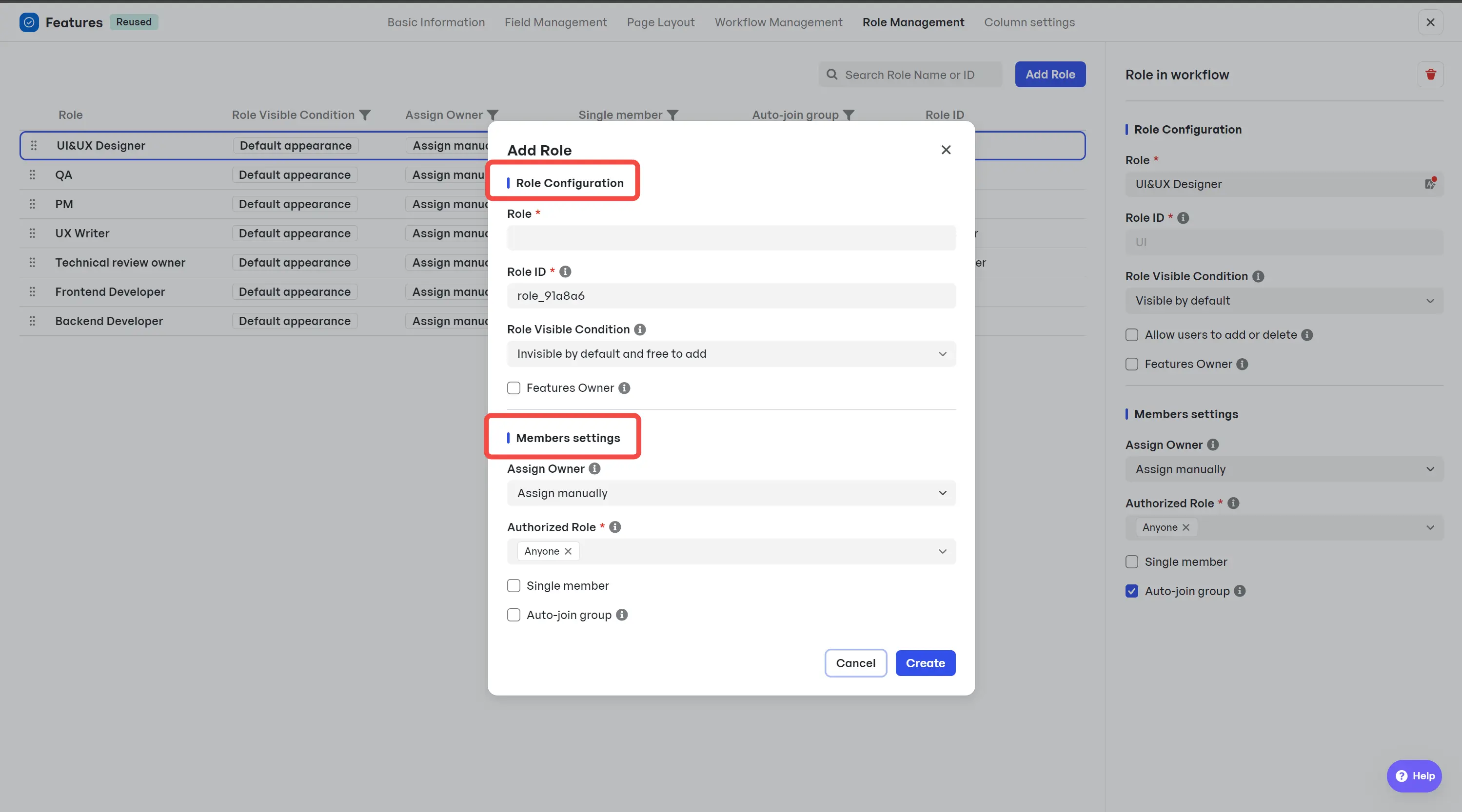 Configure project owner role for complete visibility and control in Meegle
Configure project owner role for complete visibility and control in Meegle- Delegation & empowerment: Ownership fields and task permissions enable autonomy without losing control.
- Coaching & support: Comments, progress views, and check-ins help monitor morale and unblock issues.
- Change leadership: Change logs and version tracking ensure clarity when plans evolve.
Tools used:
- Briefs, roadmaps, decision records, role mapping, feedback trackers, change logs.
How it helps:
- Builds trust and team confidence
- Balances autonomy with accountability
- Keeps momentum during change
- Encourages growth through supportive leadership
- Aligns execution with long-term vision
9. Problem-solving
Strong problem-solving means identifying roadblocks early, analyzing root causes, and implementing sustainable fixes—without losing momentum. PMs must think clearly under pressure, prioritize action, and adapt swiftly to real-world complexity.
Key components – and how Meegle supports them:
- Early detection: Dashboards, alerts, and timeline variances flag progress or cost anomalies.
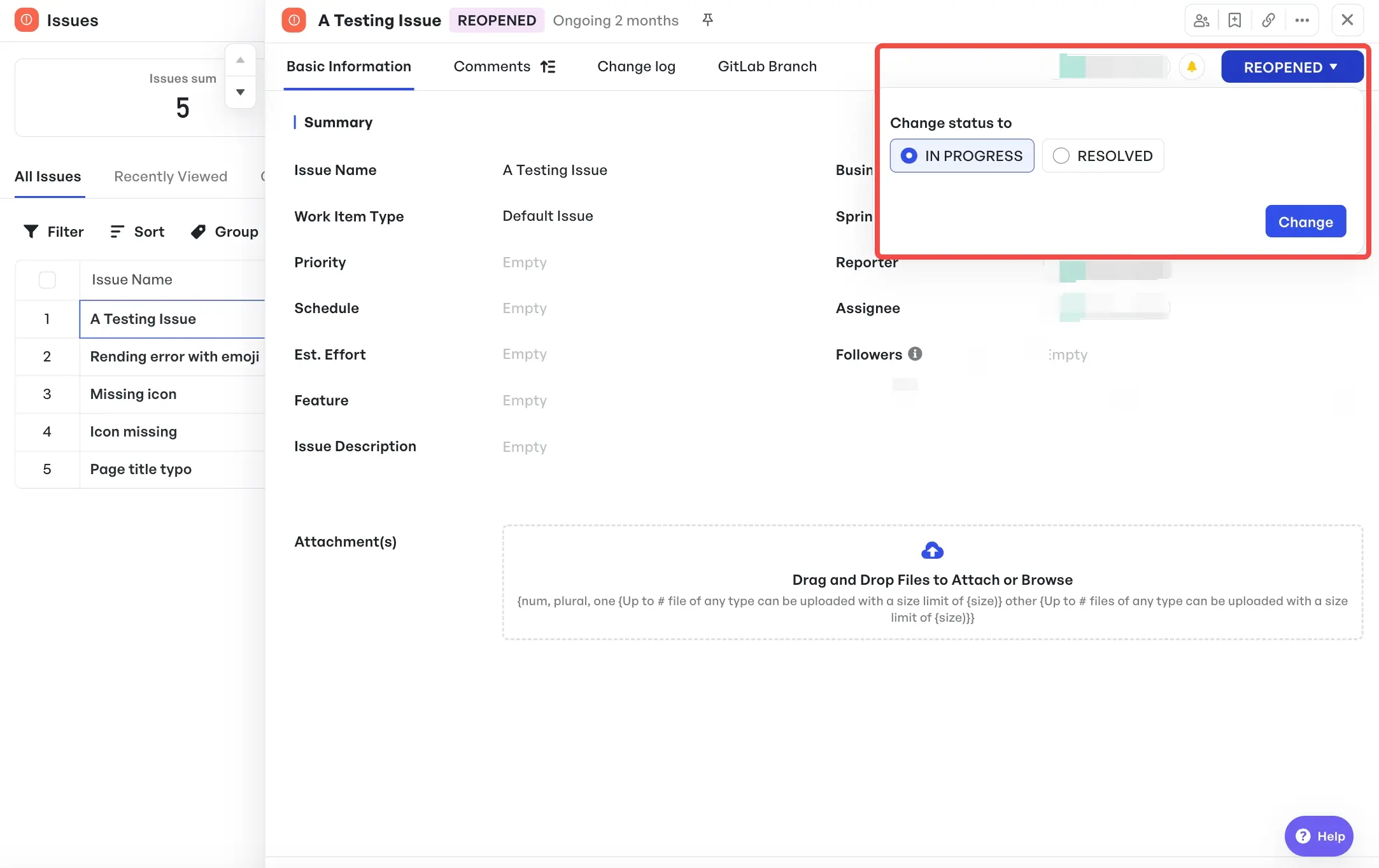 Track and resolve issues in Meegle
Track and resolve issues in Meegle- Root cause analysis: Task history, version tracking, and dependency views help uncover underlying issues.
- Prioritizing fixes: Impact-based triage using status flags and priority tags ensures smart resource use.
- Collaborative solutions: Discussion threads and resolution logs streamline decision-making and next steps.
- Learning from outcomes: Retrospective forms and knowledge entries turn fixes into preventive practices.
Tools used:
- Real-time dashboards, dependency maps, version control
- Priority tagging, decision logs, resolution threads
- Retrospectives and knowledge hubs
How it helps:
- Enables faster, smarter issue resolution
- Minimizes delays through structured response
- Prevents repeat problems with documented learnings
- Strengthens team adaptability and confidence
- Keeps projects resilient and on track
10. Negotiation
Negotiation in project management is about finding balanced solutions when timelines, budgets, or expectations are at odds. Whether aligning with stakeholders, resolving team conflicts, or securing resources, PMs must advocate for project goals while accommodating competing interests.
Key components – and how Meegle supports them:
- Expectation alignment: Goal nodes and scope documents clarify what's non-negotiable and where flexibility exists.
- Trade-off management: Visual roadmaps and workload views help present options and impact, enabling informed give-and-take.
- Conflict resolution: Task-level comment threads and role visibility keep discussions focused on facts, not assumptions.
- Stakeholder buy-in: Custom dashboards and progress reports support transparent conversations with decision-makers.
- Agreement tracking: Meeting notes, decision logs, and task updates ensure that negotiated terms are documented and followed through.
Tools used:
- Scope docs, roadmaps, goal nodes
- Workload views, decision records, meeting notes
- Comment threads and stakeholder dashboards
How it helps:
- Builds consensus without compromising critical goals
- Encourages fair, fact-based discussions
- Keeps agreements visible and enforceable
- Reduces friction during project changes
- Supports collaborative, win-win outcomes
11. Time management
Effective time management means prioritizing the right work, sequencing tasks strategically, and keeping the team aligned with project timelines. PMs must balance urgency with importance, prevent bottlenecks, and protect focus across all phases.
Key components – and how Meegle supports them:
- Prioritization: Task tags, custom fields, and focus views help highlight what needs attention now versus later.
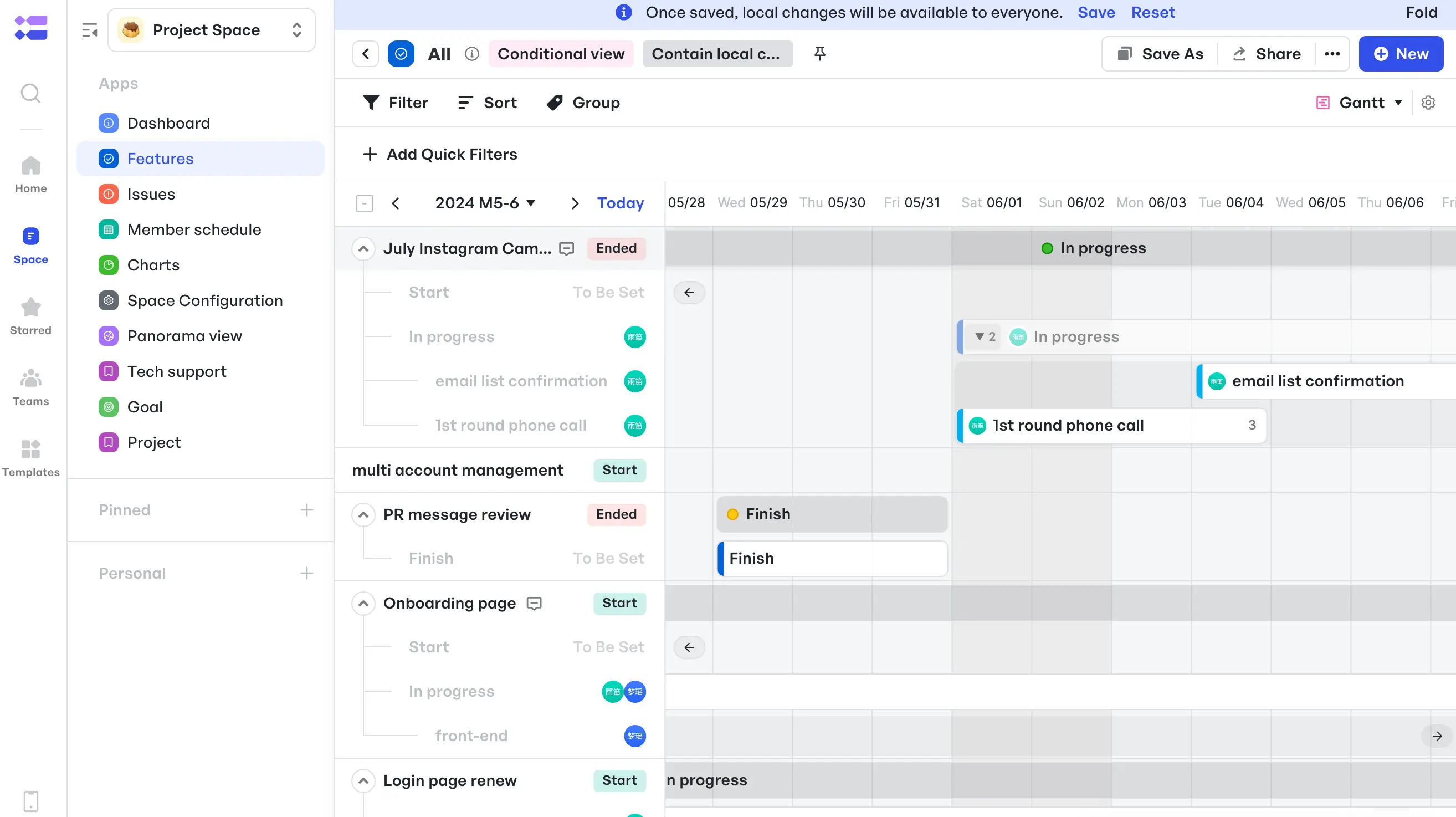 Visualized project progress display in Meegle's Gantt Chart
Visualized project progress display in Meegle's Gantt Chart- Scheduling: Interactive Gantt charts and project calendars ensure realistic timelines and surface dependencies.
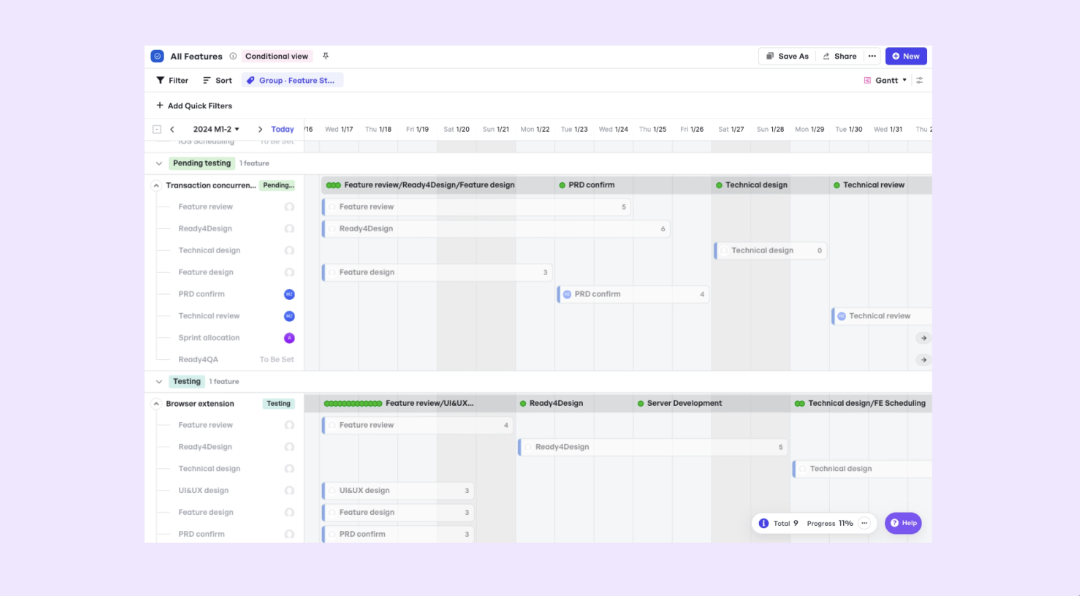 Visually map tasks on a calendar to see overlaps and track progress over time
Visually map tasks on a calendar to see overlaps and track progress over time- Workload balancing: Resource views show team capacity in person-days, helping avoid burnout or idle time.
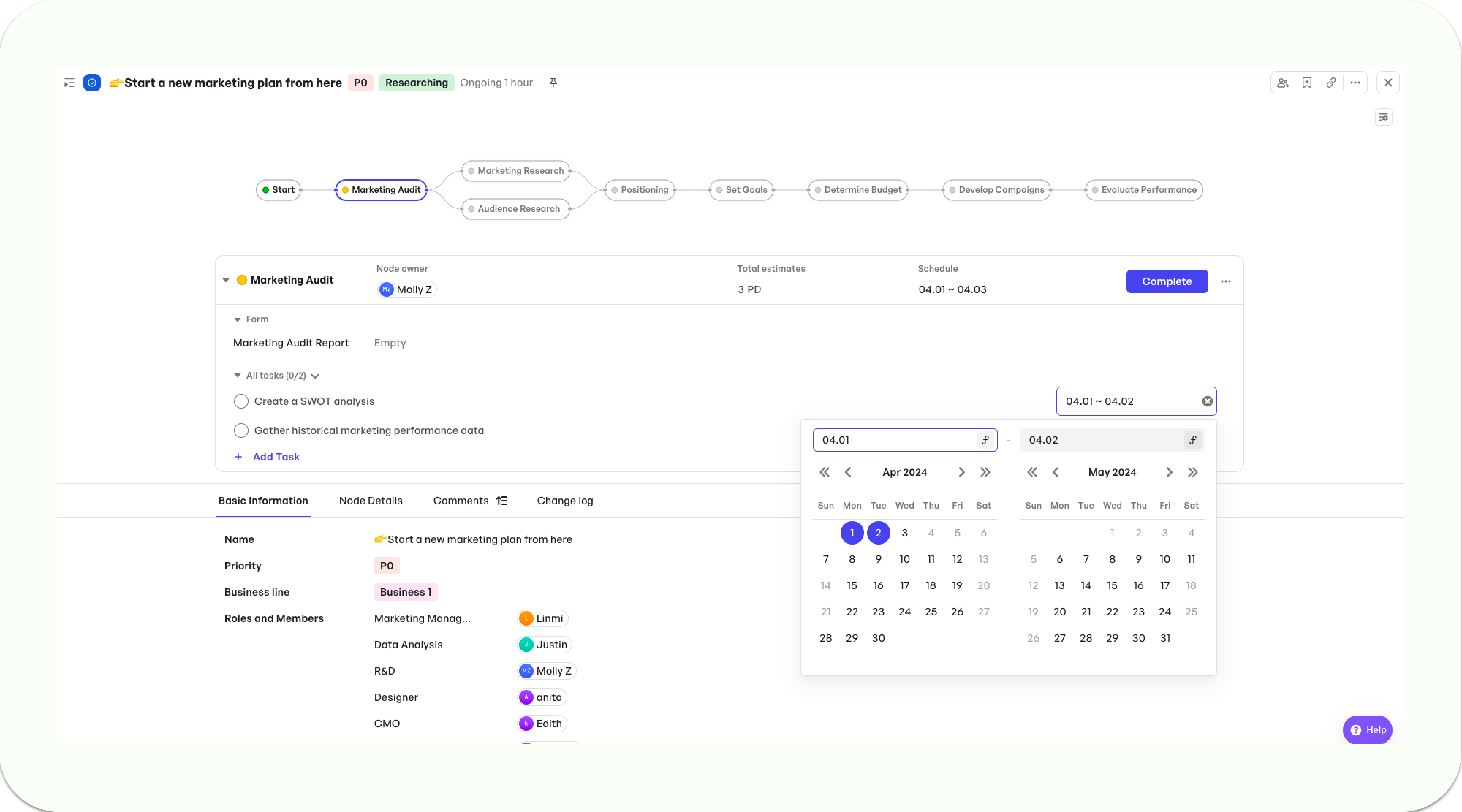 View team schedules and workloads, estimated in person-days (PD)
View team schedules and workloads, estimated in person-days (PD)- Deadline tracking: Status indicators, reminders, and progress flags make it easy to spot risks to delivery.
- Time audits: Historical views and activity logs provide insight into where time was spent and how to improve.
Tools used:
- Gantt Charts and calendars
- Focus views and workload dashboards
- Task priorities, status flags, and activity logs
How it helps:
- Keeps teams focused on the highest-impact work
- Improves delivery accuracy and predictability
- Minimizes deadline-driven stress
- Promotes accountability through visibility
- Enables continuous improvement in planning and execution
Suggested Read:👉Time Management Strategies for Increased Productivity
12. Stakeholder management
Stakeholder management is about identifying key players, understanding their expectations, and keeping them engaged throughout the project. PMs must balance transparency with tact, ensuring stakeholders feel heard—without derailing execution.
Key components – and how Meegle supports them:
- Stakeholder mapping: Role tagging and custom fields help define who needs to be informed, consulted, or involved.
- Expectation setting: Project briefs, scope docs, and milestone plans establish clarity on outcomes and timelines.
 Keep stakeholders updated on project progress and timelines
Keep stakeholders updated on project progress and timelines- Progress visibility: Personalized dashboards and status updates keep each stakeholder informed without overload.
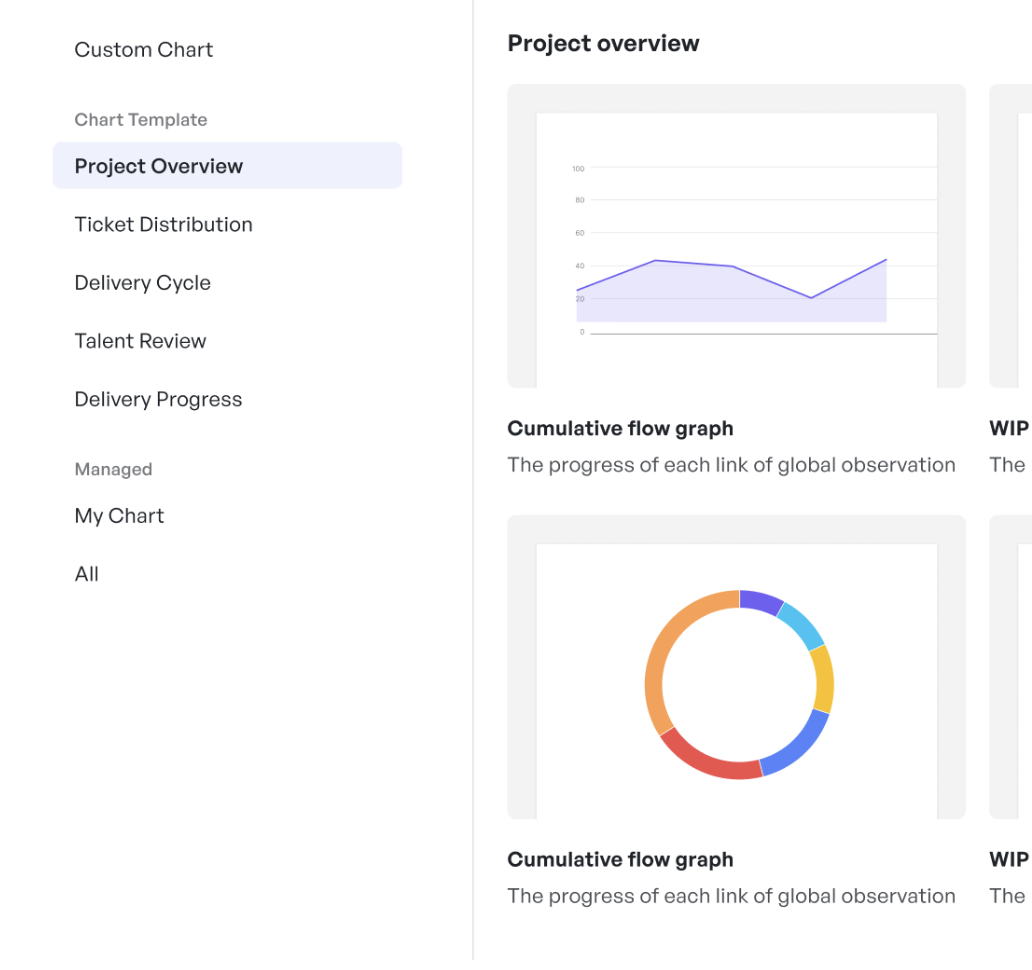 Visualize your data with charts
Visualize your data with charts- Feedback collection: Forms, comment threads, and review cycles allow structured input at critical stages.
- Managing concerns: Version tracking, change logs, and discussion threads help address objections with context and clarity.
Tools used:
- Role-based dashboards and project briefs
- Scope documents and milestone trackers
- Comment threads, review nodes, and change logs
How it helps:
- Builds trust through proactive communication
- Aligns expectations from day one
- Prevents last-minute surprises or misalignment
- Encourages collaboration without micromanagement
- Maintains momentum while keeping stakeholders engaged
Suggested read: 👉What is Project Collaboration: 6 Tips You Need to Know
Top personal skills for project managers
13. Adaptability
Adaptable PMs adjust timelines, reassign tasks, or rework deliverables without disrupting the project. They proactively review project health, anticipate change, and update roadmaps with minimal friction.
How to develop it:
- Regularly assess project risks and build contingency plans
- Practice critical thinking—consider “what if” outcomes during planning
- Embrace feedback loops and stay open to shifting priorities
- Reflect on past changes: what worked, what didn’t, and why
- Expose yourself to diverse projects to build change resilience
14. Decisiveness
PMs make choices based on available data, stakeholder inputs, and business impact. They avoid delays by setting clear decision points, communicating them, and moving forward with confidence.
How to develop it:
- Set clear deadlines for decision-making moments
- Use frameworks like pros/cons lists or impact/effort matrices to evaluate options
- Learn to trust your judgment—avoid overanalyzing when stakes are low
- Document outcomes to improve future decision quality
- Take ownership of both right and wrong calls to build confidence
15. Accountability
Accountable PMs own every aspect of project performance. They track commitments, follow up on delays, document lessons learned, and use retrospectives to improve future delivery.
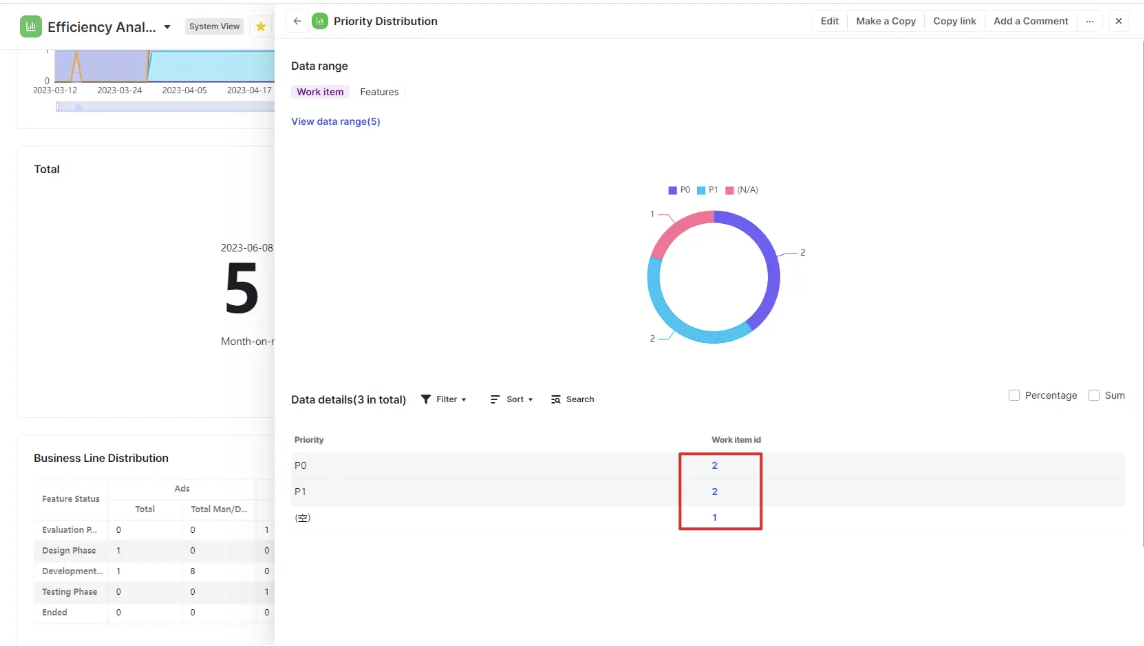 Data drill-down with Meegle Charts
Data drill-down with Meegle ChartsHow to develop it:
- Keep a personal log of tasks, follow-ups, and promises made
- Ask for regular feedback from peers and stakeholders
- Lead by example—acknowledge mistakes transparently and correct course
- Conduct structured retrospectives to learn and adapt
- Track progress visibly to stay aligned with team and stakeholder expectations
How to start practicing/implementing these skills
Fifteen skills might feel like a lot, but remember, you don’t need to master every skill right away. Some, like Agile, apply only to specific teams, while others, like time management, become second nature with consistent practice and the right tools. The key is to start small and build from there.
One of the most effective ways to begin is by shadowing experienced project managers. Join planning calls, observe how they handle shifting priorities, and pay attention to how they guide conversations without forcing outcomes. You can also take on a small internal project to start applying these skills in a low-risk setting.
A project management software like Meegle gives you a clear starting point by allowing you to create a comprehensive project board to lay out tasks and milestones. You can also set up task dependencies to understand how work connects across roles. Also, use asynchronous updates and automation rules to manage communication without constant check-ins.
Learning happens through action. Meegle gives you the space to experiment, refine your approach, and gain confidence as you go. Each project gives you another opportunity to improve, so focus on momentum, not perfection.
Experience how Meegle makes managing projects simpler, smarter, and more effective—jump in today.
FAQs
What is project management?
Project management is the practice of planning, organizing, and overseeing the execution of specific projects to achieve desired outcomes. It involves defining goals, setting deadlines, allocating resources, managing risks, and ensuring effective communication across all stakeholders.
What does a project manager do?
A project manager is responsible for overseeing the successful execution of a project from start to finish. They define the project’s objectives, create detailed plans, allocate resources, monitor progress, resolve issues, and ensure that the project stays on track. They act as the main point of contact between stakeholders and the project team, ensuring effective communication and collaboration.
What are the top project management tools?
When it comes to managing projects, having the right project management software tools is essential. Some of the best project management tools today include:
- Meegle: A comprehensive platform that offers features like task tracking, timeline management, and collaboration tools to keep teams aligned and projects on track
- Trello: A user-friendly tool focused on visualizing project tasks with boards, lists, and cards
- Asana: Ideal for tracking work progress, assigning tasks, and setting project milestones
- Monday.com: A flexible platform that integrates project management with time tracking, team collaboration, and reporting
Meegle, however, stands out for its adaptability, real-time progress tracking, and seamless integration with your team’s workflow.
Should I get a master’s in project management?
A master’s in project management can be a valuable investment if you’re looking to advance in the field. Here are a few benefits:
- Comprehensive knowledge: Gain a deep understanding of project management methodologies (like Agile and Scrum), frameworks, and the tools you’ll need to manage complex projects
- Career advancement: A master’s can open doors to higher-level positions, increasing your potential to lead larger teams and manage more impactful projects
- Networking: You’ll connect with like-minded professionals, industry experts, and professors who can provide valuable insights and opportunities
- Higher earning potential: Effective project managers with advanced degrees often earn higher salaries, reflecting their expertise and leadership capabilities
Whether you’re looking to build your expertise or move into more strategic roles, a Master’s in Project Management can set you up for long-term project success.
The world’s #1 visualized project management tool
Powered by the next gen visual workflow engineRead More
Check All BlogsStart creating impactful work today
